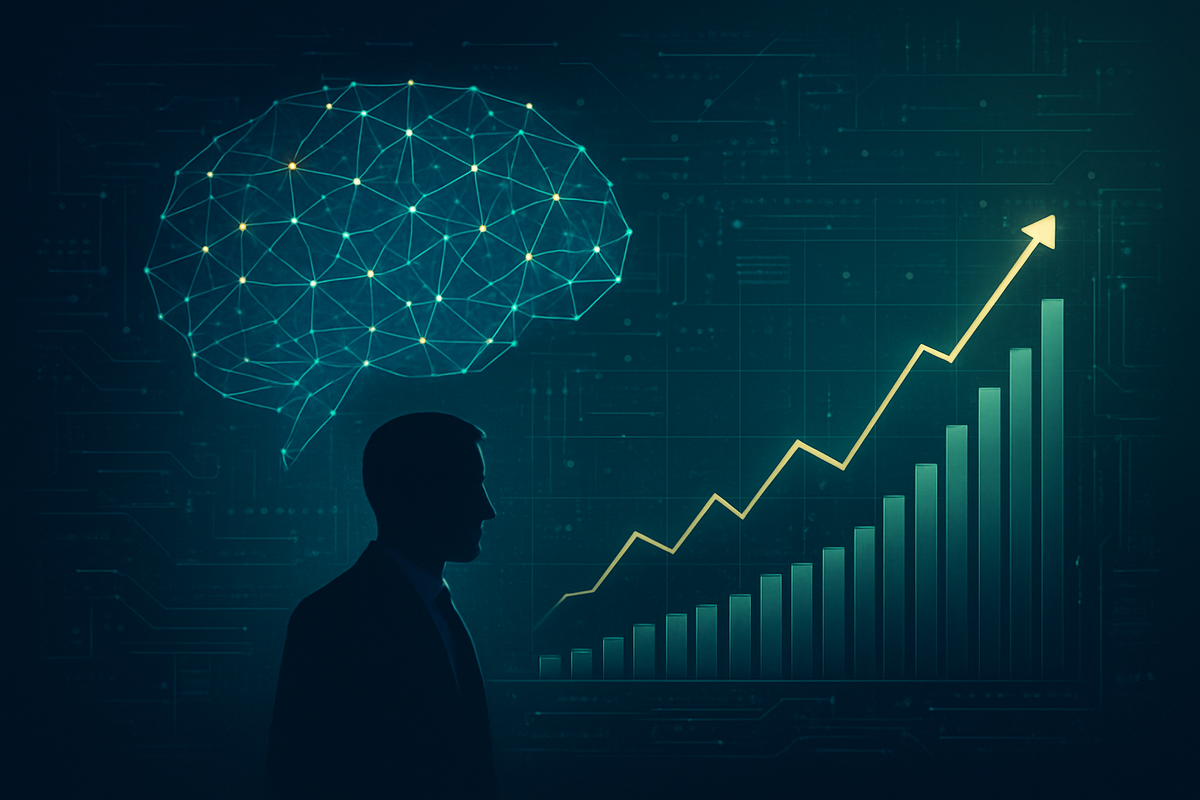
In a significant shift poised to redefine retail investment, artificial intelligence (AI) is rapidly democratizing access to sophisticated stock market trading strategies, empowering entrepreneurs and individual investors with tools previously exclusive to institutional giants. As of late 2025, the proliferation of AI-powered platforms marks a pivotal moment, enabling data-driven decision-making, automating complex analyses, and fostering a new level of confidence among those navigating the volatile financial markets. This technological revolution promises to level the playing field, offering unparalleled insights and efficiency, yet simultaneously introduces new layers of complexity and ethical considerations for the broader market.
The immediate implications are profound: entrepreneurs, often juggling multiple ventures, can now leverage AI to drastically reduce the time spent on market research and analysis. These tools offer emotion-free, data-backed recommendations, mitigating the psychological biases that frequently impair human judgment in trading. While the enthusiasm for AI in investing is palpable, with adoption rates soaring, a healthy skepticism persists regarding the sole reliance on algorithms, underscoring the ongoing need for human oversight and strategic acumen in an increasingly automated financial landscape.
AI's Ascent: Unpacking the Tools Reshaping Retail Investment
The evolution of AI in finance has been nothing short of remarkable, transitioning from rudimentary algorithmic trading to highly sophisticated predictive analytics and personalized financial assistance. At the core of this transformation are advanced machine learning (ML) and deep learning models, capable of sifting through colossal datasets – from historical price movements and real-time market feeds to global news sentiment and macroeconomic indicators. These algorithms excel at identifying intricate patterns and trends that elude human perception, continuously refining their predictive capabilities. Natural Language Processing (NLP) has become a cornerstone, enabling AI to analyze vast quantities of textual data from financial news, social media, and regulatory filings, extracting nuanced sentiment that can significantly influence stock valuations.
The development timeline for these tools has accelerated dramatically over the past few years, moving from academic research to practical applications at an unprecedented pace. Automated pattern recognition and technical analysis are now standard features, with AI scanners constantly monitoring thousands of stocks and exchange-traded funds (ETFs) for specific trading signals. Crucially, modern AI tools offer robust backtesting capabilities, allowing entrepreneurs to simulate strategies against extensive historical data, validating their approaches before deploying real capital. Companies like AInvest, with its AI-driven financial assistant "Aime," exemplify this trend, providing real-time insights and personalized trade recommendations by syncing with existing brokerage accounts. The integration of Large Language Models (LLMs) has further simplified strategy development, making it more accessible for non-technical users to build and understand complex trading algorithms.
Key players in this space include a growing cohort of fintech innovators, AI development firms, and increasingly, traditional brokerages that are scrambling to integrate these advanced capabilities into their offerings. The initial market reaction has been characterized by a surge in adoption among retail investors, with global usage of AI tools for investment decisions increasing by 46% in just one year. Sentiment is largely bullish on AI-related stocks, reflecting a broader belief that AI and digital transformation are critical long-term investment themes. However, this enthusiasm is tempered by a significant degree of caution; while many are open to using AI, only a minority fully trust AI-generated recommendations without human validation, highlighting concerns about the "black box" nature of some algorithms and their inability to predict unforeseen "black swan" events.
Navigating the AI Wave: Winners and Losers in the Financial Ecosystem
The rise of AI-powered trading tools is creating distinct winners and losers across the financial ecosystem. Fintech innovators and AI development companies are undoubtedly at the forefront of this wave. Firms specializing in building sophisticated AI/ML platforms for finance will experience surging demand for their products and services. Companies like AInvest, and numerous other startups operating in this niche, are well-positioned to capitalize on the growing appetite for advanced, accessible trading intelligence. Their ability to rapidly innovate and deliver user-friendly, powerful tools will be a key determinant of success.
Furthermore, cloud computing providers such as Amazon Web Services (NASDAQ: AMZN), Microsoft Azure (NASDAQ: MSFT), and Google Cloud (NASDAQ: GOOGL) stand to gain significantly. The immense computational power required to run and train complex AI models translates directly into increased demand for their scalable infrastructure. Similarly, high-quality financial data providers will become even more critical, as the efficacy of any AI tool is directly tied to the quality and breadth of the data it processes. Progressive brokerages that proactively integrate AI tools into their platforms, offering advanced analytics and automated features to their clients, will attract a new generation of tech-savvy investors and retain existing ones by enhancing their trading experience.
Conversely, traditional brokerages that are slow to adapt or fail to invest adequately in AI integration face the risk of losing market share to more agile fintech competitors. Their legacy systems and resistance to change could render them less attractive to modern investors seeking cutting-edge tools. Human financial advisors whose value proposition is primarily based on stock picking and basic market analysis will also need to strategically pivot. Their role is likely to evolve towards offering higher-level strategic advice, personalized financial planning, and interpreting AI-generated insights for clients, rather than merely providing recommendations that an AI could generate. Lastly, any company or individual whose business model relies on information asymmetry – exploiting exclusive access to certain analytical capabilities or market insights – will find their competitive edge diminishing as AI democratizes access to sophisticated market intelligence.
Broader Horizons: AI's Impact on Market Dynamics and Regulation
The integration of AI into stock market trading is not an isolated event but rather a central component of several broader industry trends. It significantly contributes to the democratization of finance, making advanced trading strategies and analytical power accessible to a wider audience beyond institutional investors. This trend aligns with the accelerating pace of digital transformation across all sectors, pushing financial services towards greater automation and data-centric operations. It also heralds an era of increased retail investor participation, as barriers to entry for sophisticated trading are lowered, potentially leading to a more dynamic, albeit potentially more volatile, market.
The ripple effects on competitors and partners are multifaceted. Increased competition among trading platforms is inevitable, driving further innovation and potentially leading to a consolidation of the market around the most effective AI solutions. There's also a recognized risk of a "herding effect," where widespread adoption of similar AI algorithms could amplify market movements, leading to greater volatility or flash crashes if many algorithms trigger similar buy or sell orders simultaneously. This could necessitate new forms of partnerships between AI development firms and established financial institutions, allowing traditional players to rapidly adopt new technologies.
From a regulatory standpoint, the rise of AI in trading presents significant challenges. Regulators, such as the Securities and Exchange Commission (SEC) in the US and the Financial Conduct Authority (FCA) in the UK, will need to grapple with issues surrounding AI transparency – specifically the "black box" problem where the decision-making process of complex algorithms is opaque. Ensuring data privacy and addressing algorithmic bias will be paramount to prevent discriminatory outcomes or unfair market practices. Furthermore, establishing clear frameworks for investor protection and accountability in cases of AI-driven losses will be crucial. Historically, the advent of online trading platforms in the late 1990s and early 2000s offered a precedent, democratizing access and lowering costs but also introducing new risks and regulatory complexities that required adaptation. The current AI revolution represents a similar, if not more profound, paradigm shift.
The Road Ahead: Navigating the Future of AI in Trading
Looking ahead, the trajectory of AI in stock market trading promises both exhilarating possibilities and formidable challenges. In the short term, we can anticipate a continued rapid adoption of AI tools by entrepreneurs and retail investors, driven by the desire for efficiency and data-backed confidence. This will likely lead to the development of even more sophisticated AI features, including hyper-personalized trading strategies and advanced predictive models that integrate an even broader array of alternative data sources. Increased competition among AI platform providers will be a defining characteristic, alongside initial scrutiny from regulatory bodies seeking to understand and govern this nascent landscape.
The long-term outlook suggests that AI-driven trading could become the standard for individual investors. We may see the widespread emergence of AI-driven portfolio management becoming the norm, with intelligent agents continuously optimizing portfolios based on individual risk tolerance, financial goals, and real-time market conditions. Personalized AI financial assistants, akin to having a personal quantitative analyst, could become ubiquitous. This future will necessitate significant strategic pivots from all market participants: financial institutions must either integrate advanced AI capabilities into their core offerings or risk obsolescence, while entrepreneurs must adapt by learning how to effectively leverage AI as a powerful co-pilot, understanding its strengths and limitations.
New market opportunities will undoubtedly emerge, including specialized niches for AI developers focusing on specific trading strategies or asset classes, as well as educational platforms dedicated to teaching investors how to effectively use AI tools. However, significant challenges persist. Managing and mitigating algorithmic bias will be an ongoing ethical and technical hurdle. Preventing market manipulation through coordinated AI strategies and ensuring robust cybersecurity measures to protect sensitive financial data will be critical. Addressing the fundamental "black box" problem, by developing more interpretable AI models, will be key to fostering greater trust and wider adoption.
A New Era of Investment: Confident Trading in an AI-Driven World
The advent of AI-powered trading tools marks a transformative era for stock market participation, particularly for entrepreneurs. The key takeaway is clear: AI is empowering individuals with unprecedented access to advanced analytical capabilities, fostering a new level of confidence through data-driven insights, automated processes, and emotion-free decision-making. While the allure of AI is strong, the research underscores the critical importance of maintaining human oversight. AI should be viewed not as a replacement for human intellect and intuition, but rather as a powerful augmentation, a sophisticated co-pilot that enhances strategic thinking and execution.
Moving forward, the market will likely be characterized by increased dynamism, driven by faster information processing and potentially more frequent, algorithm-driven trading activities. Investors should prepare for a landscape where data literacy and an understanding of AI's capabilities and limitations are as crucial as traditional financial acumen. This technological shift represents a permanent re-calibration of retail investing, blurring the lines between the capabilities of individual traders and large institutions.
In the coming months and years, investors should closely watch several key developments. Regulatory bodies' responses to AI in finance will be paramount, particularly regarding issues of transparency, accountability, and market stability. The continuous evolution of AI capabilities, including advancements in explainable AI (XAI) that demystify algorithmic decisions, will be a significant factor. Furthermore, observing the market performance of companies heavily invested in developing or integrating AI into their financial services will provide valuable insights into the long-term impact and adoption trajectory of this revolutionary technology. The future of confident trading is undeniably intertwined with the intelligent application of AI, demanding both innovation and judicious oversight.
This content is intended for informational purposes only and is not financial advice





